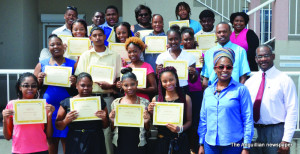 More and more young people in Anguilla are benefiting from the Job Link-up Programme, an initiative of the Department of Youth and Culture funded by the Government of Anguilla. The undertaking provides a second chance for various students, who attended the Albena Lake-Hodge Comprehensive School, to develop workplace skills and to earn employment – particularly in the private sector – largely by their own participation and commitment to the programme.
More and more young people in Anguilla are benefiting from the Job Link-up Programme, an initiative of the Department of Youth and Culture funded by the Government of Anguilla. The undertaking provides a second chance for various students, who attended the Albena Lake-Hodge Comprehensive School, to develop workplace skills and to earn employment – particularly in the private sector – largely by their own participation and commitment to the programme.
Eighteen such students have just completed a week of basic preparatory training as part of an extended programme. The training was conducted by Mrs. Janis Makeag Richardson, Coordinator of the Technical & Vocational Education & Training (TVET) Programme, in conjunction with the Anguilla Community College and the Department of Youth and Culture.
Speaking at the end of the preparatory training, Mr. Bren Romney, Director of the Department of Youth and Culture, told the students in part: “This programme does not in any way guarantee employment. It is important that you are told that over and over so that we start on the right foot. Full-time employment, through this programme, is earned. Persons who do what they are asked to do, in a consistent way, and stick with it in even when it gets difficult, are the ones who are still employed across Anguilla. In 2013, 78% of the persons who participated in the programme gained full-time employment – not because of anything we did, but because of what they did. In 2014, 83.3% gained full-time employment; and in 2015 58.2% gained full-time employment. Those who did not gain full-time employment are those who absolutely did nothing.
“What we provide for you, through this programme, is an opportunity to develop yourself personally – your professional skills – and to make contacts in the business community for employment.”
The Anguillian asked Mr. Romney to comment further on his department’s initiative: “The Job Link-Up Programme is now in its 8th year,” he explained. “It was initially developed to provide employment assistance to young persons who had particular risk factors which could be socio-economic, academic, previous encounters with the law and so on. We recognised that employment for that category of persons was particularly problematic and so we needed a programme to bridge that gap. Such a programme would be in terms of developing their literacy and numeracy skills, providing them with vocational training and apprenticeship attachments at workplaces where they can learn a skill and, while there, hopefully perform exceptionally well and develop trust with employers thus getting full-time employment.”
Mr. Romney continued: “The programme is entirely different than how it originally started. The focus on at risk youth continues, but [it also] focuses on providing [assistance to] young people with particular disabilities through the Touch Component – whether they are in a wheelchair or whatever is the case. We also work with them through physical therapy, counselling, and try to get them in full-time employment…This year we added Job Link-up Plus. This is another component which focuses on young people who do not have risk factors, but still have challenges finding employment. They have probably been unemployed for an extended period of time after leaving the Albena Lake-Hodge Comprehensive School irrespective of their efforts. We therefore added Job Link-up Plus to capture that category of young persons. We are doing the same thing for them. We are providing them with on-going career counselling and apprenticeship placements to help them build their CVs, and while they are doing that we are providing them with viability training. In September, those who are interested in developing particular skills may do so in auto mechanics, carpentry and so on.”
According to Mr. Romney, each person on an apprenticeship attachment receives a monthly stipend of EC$1,000 for six months with the hope that after that he or she would gain full-time employment.
Ms. Carla Harris, Registrar of the Anguilla Community College, said the tertiary institution was pleased to be of assistance to the Department of Youth and Culture in its Job Link-Up Programme. “We were approached to provide the training for these young people,” she stated. “Essentially they are doing the counselling and therapy programming but they wanted extra support in terms of providing actual training. We did it last year for the first time, and this year we have an extended programme. We have just finished a week of preparatory work on some basics [of the job market]. This will continue with specialised training in such areas like literacy and numeracy and eventually vocational skills.”







